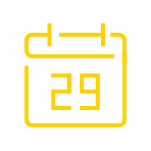About your Childhood Studies top up degree
Transform your Foundation Degree into a full BA Honours Degree with our expertly crafted early years top up degree, and open up a world of career opportunities. Develop new skills that will help you to progress in your current career, or to enable you to continue on to postgraduate study. This online top-up degree lets you build on your previous qualifications and experience in the early years sector by enriching your role and your knowledge as you learn.
Course highlights
- Ranked 7th in the country by the Guardian League Table 2024
- Transform your existing qualifications into a full honours degree in just one year with our online top-up course
- Develop a wide range of academic, practical and reflective skills that will aid your career progression
How you'll study
This course is studied online but does include a work placement
Start in September
Application deadline
Our next deadline is30th April 2024
Fees: £5,300
UK Quality Assured
Meet Early Childhood Studies student Jessica
Jessica, a Nursery Nurse from Essex chose our Early Childhood Studies BA (Hons) degree to help develop her career, gain a promotion and achieve her full potential in the Early Years sector. Distance learning allows her to study flexibly so she can balance life as a new mum.

Watch Jessica's story
Course overview
Working with young children is a hugely rewarding vocation and enormous fun. However, this sector can be fast paced and challenging. At ARU, we will help you develop the skills, knowledge and qualities that you’ll need in order to deliver a high standard of professional practice in your workplace.
Our online course can be taken over one or two years, enabling you to choose a pathway that best suits your flexibility needs. Our Early Childhood Studies degree programme is designed to provide new skills and knowledge to people currently working, or wishing to work, as a teaching assistant, early year’s nursery worker or play worker, and who already hold a Foundation Degree in Early Years Education.
It is a mandatory requirement to take a practical placement as part of this course. If you are already working in an Early Years (0-8 years) setting then this can be incorporated into your work, otherwise you will need to secure a placement. It’s a great chance to get hands-on experience in early years and education.
With the support of a mentor, you’ll undertake work-based activities and record your progress in a professional development portfolio. You’ll develop a wide range of practical and analytical skills, including the ability to think critically about your work and the setting you’re in, which are valued by employers in all sectors.
Our tutors have experience of working in the education sector and will give you regular, helpful support and feedback. Through our online Learning Management System, you will study individually and in small groups in order to develop your flexibility, independence and teamworking skills.
The course has professional recognition, taking into account both the Children's Workforce Development Council and the Early Years Professional Framework.
On completion of the top-up degree, you will have developed a wide range of academic, practical and reflective skills. By linking theory with practice, you will be equipped to undertake a range of activities in the workplace, developing your expertise within the support of your work setting, and helping you to develop critical analysis and communication skills, leadership competencies, and confidence in your abilities to pursue greater challenges.
If you don’t already have a relevant Foundation Degree we also offer this course as a full Early Childhood Studies BA (Hons).
Our advisers will be happy to answer any questions you have about the Early Childhood Studies top up degree, studying online or any other aspect of distance learning.
Modules
Early Childhood Leadership and Management
Building on the principle that good quality in early years provision requires creative and effective leaders who are able to manage resources and foster effective team development, you’ll examine the context in which education and care is provided to review issues of how we can work better to meet the needs of young children. The issues concerning provision in terms of quality and providing equality of opportunity for all children will be explored from philosophical and theoretical leadership perspectives in early childhood. We’ll provide an opportunity to critically review the application of theory to practice to further your understanding of leadership and management in an early childhood context.
Children's Rights
This module is based upon a critical exploration of children's rights with the focus on rights to education, protection, human rights and participation. The legal position of children has been enhanced by the United Nations Convention on the Rights of the Child (UNCRC) 1989 to encompass principles of protection, provision of services and participation. However, not all children's lives are the same and it is important that students of early childhood develop a broader perspective by using evidence from international and national contexts. Successful completion of this module will be relevant to students' future employment in voluntary and statutory agencies working with young children. Successful completion of this module will be relevant to your' future employment in voluntary and statutory agencies working with young children.
Interdisciplinary Perspectives
This module will give you an overview of childhood from a range of different perspectives: geographical, historical, philosophical, psychological, sociological, educational and economic. It links concepts from different disciplines to contextualise childhood and update your knowledge of the subject at the end of the course. The key topics will be: how notions of childhood vary across time and place, philosophies and constructs of childhood, the psychosocial interface and the social, political and economic world.
Leading Change in Early Childhood Contexts
Together we’ll explore how to deal with complex change, with a focus on desired outcomes. You’ll examine how education and care is provided, to review issues of how we can better meet the needs of young children in leading change in an early childhood context. We’ll look at working in partnerships and interdisciplinary working, and the challenges that these can present. Fostering your self-development, you’ll evaluate your professional growth and reflect on your experiences.
Early Childhood Graduate Competencies
To help you meet the Early Childhood Graduate Practitioner Competencies, you’ll study this module across all years of your degree. You’ll take part in 30 days of placement and reflect on your experiences. The Graduate Practitioner is an advocate for young children’s rights and participation and recognises that young children are active co-constructors of their own learning. As a Graduate Practitioner you’ll apply high-level academic knowledge of pedagogy and research evidence, of the holistic development of infants and young children (0-8), in a practice context that is respectful of the child, their family and community. This qualification will make you workplace ready with EYFS when you graduate.
Undergraduate Major Project
Your Undergraduate Major Project is a chance to raise and address significant questions relating to your chosen topic/issue. You will be supported by a tutor with similar interests and research profile. This module requires autonomous study and it is your chance to demonstrate that you have met our University’s expectations and are ready to graduate.
Modules are subject to change and availability.
Assessment
You'll be assessed in a range of ways which are designed to support the professional skills you need within the workforce. These include observations, patchwork texts, presentations, case studies, portfolios, posters, investigations, reports and essays.
Meet your tutors
Dr Kay Aaronricks
Head of School for Education and Social Care
"I'm delighted to be teaching the top-up, which includes the opportunity to engage in professional discussion with like-minded practitioners and individuals. The top-up is a great route into Early Years Initial Teacher Training (EYITT), a PGCE or a Masters Degree. We have fantastic partnerships with local settings to support students' progression into full time employment or within their existing career."
Kay's expertise is in Early Childhood Care and Education, with particular interests in the professional identity of the early year's workforce, including home based childminders and professional development through action research.
Kay has extensive experience working in the early childhood sector, initially in a private day nursery, before starting her self-employed business as an Accredited Childminder. Rated Outstanding by Ofsted, Kay provided high quality childcare and education from a nurturing homebased setting, supporting children aged from birth to eight and their families. Kay works closely with childminders and other professionals, providing continuous professional development (CPD) opportunities through workshops, action research and in developing communities of practice.
Kay began working at ARU in 2011 as a tutor and assessor on the Early Years Initial Teacher Training (EYITT) programme followed by course leadership of the Early Childhood Studies degree. Kay is a Senior Fellow of the Higher Education Academy and moved into senior leadership as Deputy and now Head of the School of Education and Social care, through which she is passionate about team culture and the student and staff experience.
Michelle Wisbey
Course Leader, BA Montessori Early Childhood Studies, MA Montessori with Education
Michelle’s expertise in early childhood education and practice. She has a particular interest in children risk taking and the Montessori Approach.
Michelle has over 25 years' experience running her own Montessori nurseries and pre-schools. She and her team currently run five Montessori nurseries and pre-schools in Essex.
Michelle is the Course Leader for the MA Education with Montessori and BA (Hons) Montessori Early Childhood Studies, along with continued involvement in the delivery and assessment of the new Early Childhood Graduate Practitioner Competencies. Additionally, she supervises undergraduates with their final year Major Projects and provides support to students throughout their studies.
Michelle has mentored and tutored students in Early Years education for the last eight years and has supported Early Years settings to achieve the best outcome possible in Ofsted inspections.
Her opportunity to work in settings with newly qualified Early Years teachers and leadership has led to the development of an interest in creating best practice models of practice both in the UK and in Malawi.
Mallika Kanyal
Co-Programme Director, Senior Lecturer
Mallika has extensive teaching and research experience in the field of education, especially early childhood.
Mallika’s academic lead experience includes co-programme directorship of the Professional Doctorate in Education; senior lectureship; course leadership; interim directorship of faculty learning, teaching and assessment; faculty Athena Swan lead and faculty admissions tutor on the University Accreditation of Prior Learning (APL) panel. She leads a range of undergraduate and postgraduate modules.
Mallika's main teaching is around children's rights, childhood research, professional development and research methodology. She teaches face-to-face and online, and on the modules taught at the partner institutions.
Dr Leanne Gray
Course Leader BA Early Childhood Studies
Beginning her teaching career in 2005, Leanne has spent over 15 years teaching across the whole primary age range in schools in London and Essex. She became an Advanced Skills Teacher in mathematics and early years before moving into a senior leadership role. She was a deputy head in primary schools in both Southwark and Tower Hamlets before moving to a headship in Essex. She has extensive experience of working with pupils with English as an additional language.
Leanne’s doctoral research focused on preschool counting and explored what development looks like in counting for a child during the nursery year. She is interested in early years and primary education, with a particular focus on mathematics, outdoor learning, and learners with English as an additional language.
Dr Paulette Luff
Course Leader
Paulette has worked in the field of early childhood throughout her career as a teacher, foster carer, school-home liaison worker, nursery practitioner and advisor, and as a childcare and education lecturer in further education. These different areas of work experience have inspired a deep interest in the ways that children and adults develop understandings of the world and the pedagogies that promote learning.
Paulette joined Anglia Ruskin University in 2003 and is currently a senior lecturer in the Department of Education. She enjoys teaching modules linked to early childhood curriculum and pedagogy, especially 'Supporting Children's Learning' where students undertake projects on areas of continuous provision and also compare different curricula. Paulette currently leads the MA Early Childhood Education and is keen to share ideas about early years practice and professionalism.
How you'll study
Our Early Childhood Studies (top-up) BA (Hons) is studied predominantly online, but you’ll also take part in 30 days of placement. If you are not currently working in a relevant setting, we will help you find a suitable work placement.
You’ll study through Canvas, our world-class online Learning Management System (LMS), which can be accessed from your phone, PC, or tablet, both at home or on the move. Canvas provides instant access to study materials, forums, and support from tutors and classmates, as well as enabling easy submission of your assignments.
You can choose to study our BA (Hons) Early Childhood Studies top up degree over 1 or 2 years. Please note that if you choose the 1-year option this is the equivalent of full-time study and may be a challenge if you’re employed full-time or have other life commitments. Our advisers will be happy to talk through your options in more detail.
On successful completion of your studies, you’ll be invited to attend a graduation ceremony on campus. If attending the ceremony in person is not possible then we’ll arrange to have your certificate sent to you.
Supported distance learning
We understand that distance learning is different to traditional campus study and if you’re new to online study you may have concerns or apprehensions about studying your early years top up degree online, and that’s natural.
To help put your mind at ease we have a dedicated Distance Learning Support Team to help and support you throughout your time at ARU, starting with your first online induction and staying with you right through to graduation. In addition, you’ll also be supported by specialist early years tutors, well experienced in supporting distance learning students.
Once you start your childhood studies top up degree, we encourage the creation of online communities and many of our learners find these connections with others invaluable, helping them to stay motivated, share concerns or make new friendships.
Contact us to talk through any questions or concerns or visit our support page for more information about the support services available.
Gold-standard education
We're proud to have received a Gold award for the quality of our education in a UK-wide review of university teaching standards.
Why we're rated Gold
Our course content and delivery is rated as outstanding with the review citing ‘innovative and highly effective course design and content that inspires students to actively engage and commit to their learning’.
We’re also rated outstanding in the areas of:
- student engagement in learning
- learning environment and academic support
- learning resources
- student engagement in improvement
- approaches to supporting student success
- intended educational gains
- approaches to supporting educational gains.
What is the Teaching Excellence Framework?
The Teaching Excellence Framework (TEF) is a national scheme run by the Office for Students that focuses on the areas students care most about: teaching, learning, and achieving positive outcomes from their studies.
It has three outcomes: Bronze, Silver and Gold.
This rating was awarded in September 2023, and lasts for four years.

Be part of the University of the Year
We're proud to be the Times Higher Education (THE) University of the Year 2023.
The prestigious THE awards honour ’exceptional performance during the 2021-22 academic year, and reflect ARU’s success in delivering high-impact projects during this period, despite the challenges of the Covid-19 pandemic.
The award recognises the difference we make in the region and our communities – while also acknowledging the broader impact of our world-leading research, and the contributions our students and graduates make to society.

Careers
What could an Early Childhood Studies top up degree do for my career?
Our Early Childhood Studies degree aims to build upon your existing qualifications to help you progress your career, open doors to leadership positions and enable you to gain influence and authority in the workplace. By building on your existing qualifications, you’ll add a valuable strength to your CV that will help you stand out from the crowd in a competitive job market, making you an attractive prospect for either the next step in your current career, or an asset to a new employer if you choose to embark down a new path.
The early childhood studies arena is one that is continuously evolving, with theories and new programmes continually being updated and implemented. A top-up course will keep your knowledge up to date and give you the tools to keep up with the changing nature of the field, aiding long-term job security and ultimately making you more valuable in your chosen industry. As well as empowering you to develop your career, this course will also boost your ability to deliver in your chosen child-centric role, enabling you to make a positive impact on young lives.
Our BA top-up degree will also give you transferable skills that will help you in all aspects of your career. Not only will you gain a deeper understanding of child development, but you will also have the opportunity to develop your communication, time management, and research skills.
What job roles can I consider with a BA (Hons) Early Childhood Studies top up degree?
An Early Childhood Studies top up degree could lead to a wide range of career opportunities within education, health, and social care sectors with further training and/or qualifications. These are just some of the job roles that Early Childhood Studies Top-up BA (Hons) graduate may consider, possibly with further training depending on the role:
- Early Years Teacher
- Family Support Worker
- Teaching Assistant
- Learning Mentor
- Health Play Specialist
- Education Consultant
- Play Therapist
If you are looking for more information about these job profiles and potential salary earnings see Prospects.ac.uk. It’s important to note that salaries can vary widely depending on the job role, employer, industry sector and location.
What skills will I get from an early years top up degree to help my career?
Choosing to study an Early Childhood Studies BA (Hons) will give you many transferable skills. Here are just some of them:
- You will develop critical thinking skills
- Learn to communicate effectively in a variety of media
- Apply creativity and critical analysis
- Be able to visualise and instigate change in practice
- Manage your own CPD
What can I study after an Early Childhood Studies top up degree?
Depending on your long-term goals and desired career, you may consider a postgraduate degree in a related subject such as Education with Early Childhood MA or Education with Montessori MA. A Master’s degree is the most common type of postgraduate qualification and usually focuses on a specific area of a wider subject which may support your future career development. Having a bachelor’s degree under your belt is a key entry requirement in opening doors to postgraduate study.
Careers Advice Service
Once you become an ARU student you will be able to access our Employability service to help you at whatever stage of your career, whether that’s landing your dream job or the next progression step.
We offer:
- careers advice, including one-to-one online and telephone appointments with our experienced advisers
- help with your CV, job searches, applications and interview preparation
- an online portal packed with useful careers resources
- our Employability Programme, which helps you hone the skills employers say they want in graduates.
Entry requirements
- A Foundation Degree (or other recognised Level 5 qualification) in Early Years Education*
- Experience working in the Early Years sector
- If English is not your first language you will be expected to demonstrate a certificated level of proficiency of at least IELTS 6.0 (Academic level) or equivalent English Language qualification, as recognised by ARU
- A current Enhanced Disclosure and Barring Service (DBS) is required.
- Qualifications may also be considered for Accreditation of Prior Learning (APL).
*Please note: We are unable to accept previously achieved credit from the City & Guilds Level 5 Diploma in Leadership for the Children and Young People's Workforce - Early Years (Advanced Practice) qualification as it doesn’t provide the pre-requisite 240 credits. You would first need to complete our Early Years and Education FdA course and then you can automatically progress to this top-up course to complete your degree.
- You will need to provide evidence that a satisfactory Disclosure and Barring Service (DBS) clearance has been undertaken.
- If you have lived outside of the UK for 6 months or more within the last 5 years then you will need to provide a police check from the country/countries previously resided in
- If you are completing placements overseas you will be required to obtain a police check/certificate of good conduct from the relevant country
- As a distance learner, you'll also need a suitable computer with internet connection, together with sufficient IT competence to make effective use our online learning management system (LMS) with high-speed internet and email.
Fees & funding
Fees
The full tuition fee for this childhood studies top up degree is £5,300.
The tuition fees you pay each year for the full Early Childhood Studies (top-up) BA (Hons) will be between £2,650 and £5,300 depending on the length of study. The course is studied over 1 or 2 years.
Accredited prior learning may reduce the tuition fees. This will be confirmed once your application has been submitted.
Funding
Government-backed part time student loans are available to cover the cost of studying this course. These are subject to eligibility and terms and conditions.
We offer payment by instalments, so you can spread the cost of studying with us.
For military students: You can use your ELCs towards this course. ARU is a recognised ELCAS provider (number 1007). Please contact your Learning Centre for details of ELC, eligibility and how to apply.
For more information on how you fund your studies please see our funding page.
What our students say
The course has benefitted my career. The confidence I have taken from completing my modules to a high standard has translated to confidence in performing my duties at work.
The tutors understand the challenges and do what they can to help and support you on your journey. I am very proud of myself for finally accomplishing what I have been meaning to do for many years.
The support from ARU has been amazing. Since day one, I have felt so supported and reassured. Being a distance learner, you do not feel like you are on your own.
ARU is a well-established, internationally recognised University. I chose to do a degree here to improve my career opportunities and personal aspirations of becoming a teacher.
Frequently Asked Questions
Further reading











